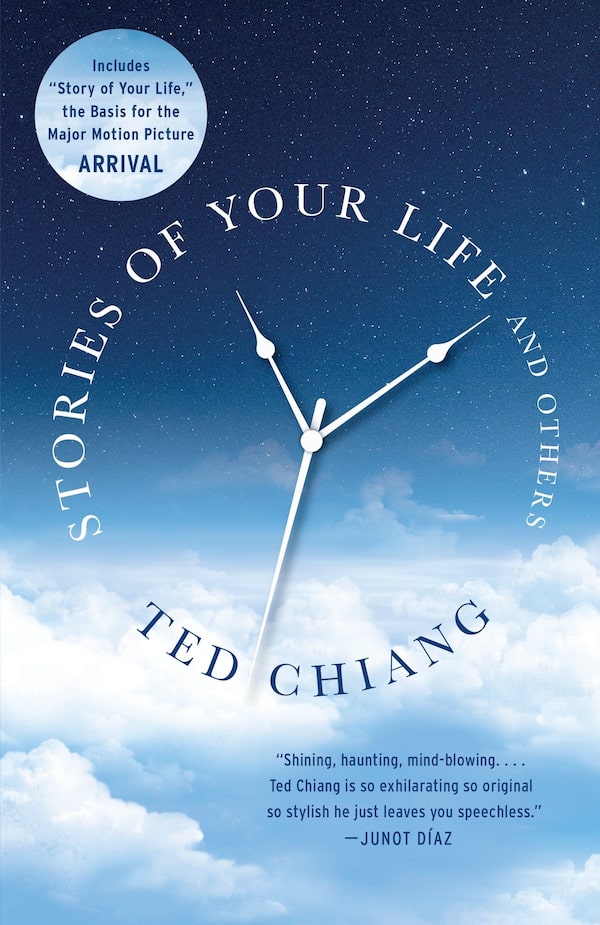Science fiction and fantasy TV shows have always tried to make complex moral and scientific concepts accessible and interesting. Severance, Westworld and The Good Place are just a few of the latest to win critical acclaim because of the way they pair challenging ideas with engaging plots and characters.
If you were drawn to any of those shows because of the way they made you think, then there are plenty of sci-fi and fantasy books that might be perfect for you.
Here are four books in which ideas are the stars. Whether funny or dramatic, intimate or epic, all of them will leave you pondering.
Stories of Your Life and Others, Ted Chiang (Vintage)

Handout
If you’re dipping your toe into the world of idea-driven science fiction, Ted Chiang’s short story collection is a good place to start.
After his emergence onto the literary scene in 1990, Chiang spent 12 years publishing inventive stories in literary magazines and winning awards for them. They were gathered together in this 2002 release. Each one deals with different ideas and themes, giving the reader a sense of how diverse science fiction can be.
The eponymous novella, Story of Your Life, is a 1998 tale of linguistics, free will and alien invasion. Chiang spent years teaching himself linguistics to construct an alien script unlike any that exists on Earth. The story is the basis for the 2016 movie Arrival, starring Amy Adams.
The collection also contains the short story Tower of Babylon, a fantastical reimagining of the biblical tale. In Chiang’s version, the tower has been under construction for centuries, but the builders have recently hit a snag: at the top of the world, they encounter a roof. So they turn from building to drilling. What happens next is surprising and delightful.
The Just City, Jo Walton (Tor)

Handout
Like The Good Place, the first book of Jo Walton’s Thessaly trilogy spins an entire yarn from works of philosophy – specifically, one book, the urtext of the Western philosophical tradition: Plato’s Republic.
When the goddess Athena decides to make Plato’s thought experiment in the Republic a reality, she ventures across the time stream, plucks the brightest minds of the Mediterranean civilizations out of their own moments and places them all in the ancient past.
There, historical figures such as Cicero and Lucrezia Borgia begin to realize Plato’s dream. They build a city constructed specifically for the pursuit of philosophy, so that the best among them may eventually discover the true nature of justice and goodness.
All proceeds as expected, until Socrates himself shows up and begins questioning everything Athena has tasked the philosophers with doing.
Walton’s true innovation in this novel is the way she lambastes Old World attitudes toward women by making consent a key theme. For hidden among the human philosophers is the god Apollo. And if he is to understand justice, he must first reckon with the rapes and assaults he has committed.
The Dispossessed, Ursula K. Le Guin (Gollancz)

Handout
It’s hard to beat the classics. In the 1960s and 70s, the late, great Ursula K. Le Guin helped shift science fiction away from the natural sciences and toward the social sciences. The Dispossessed, published in 1974, is among her finest works, a parable of anarchism and the struggle for human freedom.
When the brilliant physicist Shevek leaves his anarchist home world for the neighbouring capitalist planet, he is sickened by a society whose inequalities are foreign to him. Yet he is also given freedom to pursue his research – a liberty not available to him back home, where all labour is communal and selfless.
Le Guin was never naive – the novel was originally subtitled “an ambiguous utopia” – and her moral appreciation of anarchism is balanced by a clear understanding of its idealistic nature. At the same time, she knows whose side she is on and isn’t afraid to make her position clear. Shevek says at the end of the book: “All you have is what you are, and what you give.”
Le Guin’s oeuvre is packed full of thought-provoking work, including the anti-utilitarianism short story The Ones Who Walk Away from Omelas and the novel that was gender-bending before it was cool, The Left Hand of Darkness.
Babel, R.F. Kuang (HarperCollins)
R.F. Kuang’s first standalone novel, Babel, was just published in late August. It is tailored to the dark academia aesthetic: an Oxford novel set in the 1830s about a close-knit group of nerds who love each other fiercely but are divided by a rebellion against the British Empire.
In addition to being a bestselling author at age 26, Kuang is also an academic who studies Chinese languages and history. She has used all her expertise to create the world of Babel. In this alternate history, the British Empire’s dominance comes from the use of magical silver bars that run on translation errors.
For example, the Chinese word wuxing, meaning formless, can be inscribed on one side of a bar and translated as “invisible” on the other. The lost implication – incorporeality, shapelessness – will manifest physically, and whoever holds the bar will dissolve into the air.
Babel is packed with discussions about translation and etymology that are never boring. And when the themes turn to violence and oppression, academic curiosity becomes political animus. Characters fight over the moral justification for violence, and their views include talking points from the modern day. Despite being set almost 200 years ago, Babel feels frighteningly apt for our time.
Expand your mind and build your reading list with the Books newsletter. Sign up today.